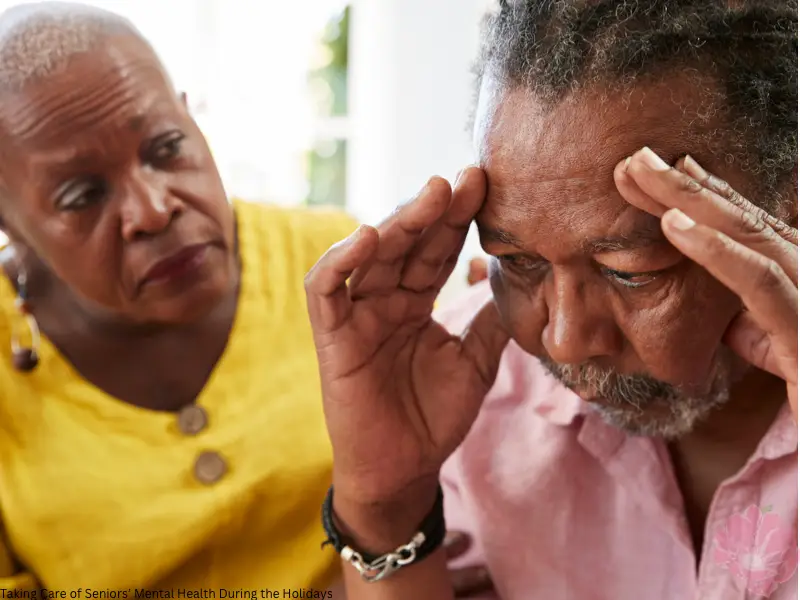
It can be the most wonderful time of the year. But for many of us, the holiday season can also have a bittersweet undercurrent, stirring up memories of our histories and relationships, and leaving us with feelings of sadness and separation. For the senior population, especially, this can progress to depression, as multiple mental health studies have shown.
As the family or support person of a senior, here’s what you should know about tending to their mental health — and your own — at this complex and layered time of year.

Causes of Holiday Depression
For older individuals, the holiday season can make them more aware of the passage of time. The absence of their own parents, siblings and friends can hit home very poignantly, as can their loss of independence or mobility. Financial limitations may loom large as well, and past reunions or traditions may not be possible for them. The shifting meaning of the holidays can easily lead to low spirits and preoccupied thoughts. Moreover, the cultural expectation to feel a special kind of joy and happiness at the end of the year can, unfortunately, further deepen the holiday blues.
Signs of Depression to Watch For
While typical holiday sadness fades over the days and weeks, depression does not. Depression is a medical condition, and telltale signs in your loved one can include a withdrawal from social activities to avoid interacting with others. You may notice that they seem tearful, irritable, or weighed down by worries, exhibiting a lack of interest in their usual pursuits and pleasures. They may be reluctant to tend to their personal care, including things like bathing, brushing teeth, and even eating meals. They may lack energy and want to sleep during the day, have trouble falling or staying asleep at night, or struggle with concentration and slowed thinking.
Different Generational Understanding of Mental Health
While you may be able to wrap your head around modern ideas of mental health, older individuals may struggle to do so. It’s all too common for them to have difficulty recognizing and describing how they themselves are feeling. It’s important to bear in mind that depression, as a biological diagnosis, was very likely not in the cultural conversation when they were growing up. Rather than understanding their depressed condition as a medical matter, they may feel ashamed about it, viewing their feelings of worthlessness and helplessness as a sign of weakness.
Experiencing Depression as a Caregiver
As a support person and caregiver to an elder person, it is very normal for you to be affected by their anxieties and feelings of sadness. Depressive thoughts can happen to anyone, at any age, so be sure to recognize your own susceptibility. Your mental health is important, too, and it’s incredibly important that you tend to your own mental state to avoid becoming mentally and physically depleted.
Seeking Treatment
Left alone, depression not only hinders the enjoyment of life, it also takes a very real toll on mental and physical health. That’s why talking about depression and seeking treatment is so important. If your senior loved one — or you, as their caregiver — are feeling these kinds of low feelings, please know that you’re not alone. Like any other form of medical illness, depression can be treated and managed, and the first step is finding someone to talk to.
Consulting with a healthcare provider can be a life-changing decision. He or she can give you and your loved one much-needed access to the appropriate support systems, therapy, or medications. And in time, with the right treatment and support, your loved one can start to heal and strengthen, finding fulfillment in the “new normal.”
How Just Like Family Can Help
If you’re in need of additional support this holiday season, or any time of the year, a Just Like Family team member can be an invaluable addition to you and your loved one’s life. Offering companionship, encouragement, a listening ear, and so much more, our professional support workers are ready and qualified to strengthen your loved one’s support system.